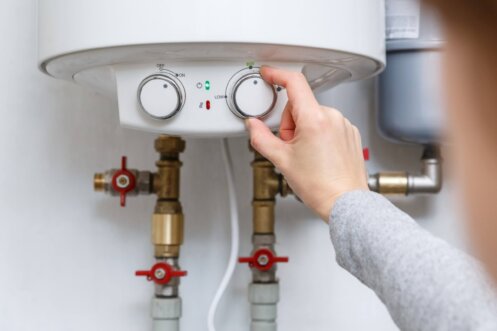Exploring Eco-Friendly Water Heaters for Sacramento Homes
Although you may not realize it, water heating is an average home’s second-biggest energy use category. Only your home’s HVAC uses more energy than its water heater. That means heating water for use in your home is a major contributor to your carbon footprint. The good news is that there are several eco-friendly water heater options to help decrease your negative impact on the environment while ensuring convenient and affordable access to hot water whenever you need it.
Heat Pump Water Heaters
If you currently own a storage tank water heater and want an eco-friendly alternative with a similar footprint, consider a heat pump water heater. They look and work much like a conventional electric storage tank heater but are a bit larger. The extra space houses some additional components that supercharge the heater’s efficiency rating. The components harvest heat energy from the air surrounding the unit. That extra heat energy helps heat water in the tank, reducing the load on the system’s electric heating element.
According to the Department of Energy, heat pump water heaters can be two to three times as efficient as conventional electric heaters. You can ensure maximum savings if you purchase an ENERGY STAR-certified model. These units boast average lifetime energy cost savings of $3,830 for a medium-sized household. Plus, they work very well in climates like ours in Sacramento. It ensures the heat pump has ample heat energy available for collection year-round.
Tankless Water Heaters
If you don’t mind switching away from a storage-tank water heater, a tankless model makes an excellent eco-friendly upgrade. They use high-power heating elements to produce hot water on demand. This comes with a more significant advantage in efficiency than you may realize. This is because storage tank heaters have an inherent efficiency flaw in their designs. They store hot water for future use, which results in inevitable heat loss while on standby. Even modern, well-insulated storage tanks suffer from this problem. As a result, a storage tank heater must, sometimes, reheat its stored water to maintain a specific set temperature.
A tankless water heater avoids those losses, leading to more efficient operation. If you have a low hot water usage home, a tankless heater could cut your hot water-related energy use by 34%. High-use homes can also reduce their energy use by up to 14% relative to a storage tank. Plus, tankless water heaters can supply an endless stream of hot water. They activate on demand and keep working until demand ceases. If you love taking long, hot showers, you’ll love a tankless water heater.
One downside to a tankless water heater is that the largest models operate on natural gas. So, if you want one that can serve your whole home, an electric model isn’t likely an option. However, if your home is naturally gas-free, you can use multiple electric tankless heaters instead. Unfortunately, you’d trade away much of your potential efficiency gains in the process. The upfront cost of a tankless model is higher than a tank-based model, but the long-term savings are usually worth the cost.
Solar Water Heaters
If you want the ultimate in eco-friendly water heating, you could opt for a solar water heater. As their name implies, they use solar energy to provide your home with hot water. This can translate into energy savings as high as 80% relative to other water heater types. There are two primary varieties of solar water heaters you can choose from.
Active Solar Water Heater
There are two types of active solar water heaters available. The first is a direct circulation system. They use a pump to circulate water through a solar collection plate and a storage tank. This ensures a tank full of hot water that’s always ready for use. Direct circulation systems work best in warm climates that rarely drop below freezing. That makes them ideal for Sacramento homes.
The other type of active solar water heater is an indirect circulation system. They use a specialized heat transfer fluid that collects solar heat. The fluid circulates in a closed loop and transfers heat to water in the system’s storage tank by way of a heat exchanger. They’re slightly less efficient than direct circulation models. However, they have the advantage of working at all temperatures.
Passive Solar Water Heater
Passive solar water heaters use gravity and the pressure of your incoming water supply to work. As a result, they don’t use any electricity or other fuel whatsoever. The typical passive solar water heater system has the same components as an active one, except for a pump. In its place, passive systems locate their storage tanks horizontally above their solar collection components.
The position of the storage tank is the secret to how passive solar water heaters work. They rely on the natural stratification that takes place when you mix hot and cold fluids. The horizontal storage tank has a water outlet near its top and an inlet near its bottom. The solar collection components connect to the lower part of the tank. As a result, colder water naturally flows toward the collection components. As the water heats, it rises until reaching the storage tank’s top.
When you call for hot water, the outlet draws water from the tank’s top. That creates room in the system for more incoming cold water. The result is a pump-free water loop that produces hot water as needed.
Geothermal Water Heating
Finally, if you’re looking for an eco-friendly HVAC and hot water solution, you can install a geothermal system. This ensures the most efficient HVAC possible and can lower your hot water-related energy use. The savings come from the addition of a device called a desuperheater to your geothermal system. It captures waste heat from your geothermal HVAC system and uses it to augment hot water production.
A geothermal desuperheater can eliminate direct water heating energy use in the summer. It uses heat energy extracted from your home’s air to heat water in a storage tank. Otherwise, that heat energy would get deposited into the ground through the geothermal system’s ground loop. In the winter, the desuperheater uses leftover heat from the HVAC heating function to augment hot water production. While it is less efficient than in the summer, a desuperheater still reduces hot water energy needs during cold months.
Eco-Friendly Water Heating Experts
If you’re looking for an eco-friendly water heating solution in Sacramento, CA, Crystal Blue Plumbing, Heating & Air can help. Our family-owned and operated business has served residents for over 40 years. We sell and install efficient storage tank-based and tankless water heaters. You can also rely on us for plumbing repairs and installation as well as water treatment services.
Our plumbers have industry-leading training and years of practical experience. And you can count on us to provide upfront, no-surprise pricing. If you want an eco-friendly water heating solution in Sacramento, call Crystal Blue Plumbing, Heating & Air today!







